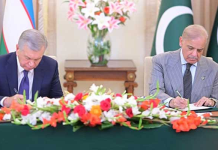ISLAMABAD: Supreme Court’s Justice Mansoor Ali Shah, in a two-page letter, has warned of the executive’s control and influence over the court’s image and Judicial Commission of Pakistan (JCP), respectively.
“It is imperative that the Court’s image is not allowed to drift under the control or convenience of the executive which now appears to wield disproportionate influence over the affairs of the JCP,” Justice Shah wrote in the letter written prior to the June 19 session addressed to the JCP secretary.
The letter is to be interpreted against the backdrop of JCP’s Thursday session, presided over by Chief Justice of Pakistan (CJP) Yahya Afridi, that gave its nod to extending the tenure of the constitutional bench until November 30, 2025.
The parliament, back in October 2024, had approved changes to the Constitution, which included empowering the legislature to pick the chief justice, fixing the top post’s tenure, and forming constitutional benches — a move challenged by the Pakistan Tehreek-e-Insaf (PTI), Jamaat-e-Islami (JI), Sunni Ittehad Council (SIC) as well as bar associations and former presidents of the Supreme Court Bar Association (SCBA).
Following the amendment, CJP Afridi-led JCP constituted the bench in a 7-5 split decision, with a majority of the members voting in favour of the constitutional bench.
Meanwhile, senior-most judges Justice Shah and Justice Muneeb Akhtar and opposition PTI members Omar Ayub and Shibli Faraz opposed the decision.
Earlier this week on Thursday, the JCP held two sessions wherein the body approved the extension in the first meeting deliberated on a policy decision under Article 175A(20) of the Constitution concerning the annual performance evaluation of high court judges.
In the second meeting, the top judicial body, by majority, extended the term of the constitutional benches of the Sindh High Court (SHC) for six months, effective July 23, 2025.
In his letter, Justice Shah stressed that the JCP should wait on extending the term of judges on the constitutional bench till the constitutionality of the 26th Constitutional Amendment was decided by the SC.
“Proceeding with extensions or re-appointments to a constitutional bench whose very legal foundations is under serious constitutional challenge further deepens the institutional crisis and weakens the court’s legitimacy,” the judge remarked.
The senior judge, while stressing the need to decide the 26th amendment case, said that the JCP must realise that continued delay in this matter was “visibly eroding the credibility of the court and shaking public confidence in its neutrality”.
Noting that it was regrettable that the JCP was “insensitively prioritising matters of judicial extensions”, Justice Shah said that all SC judges must be nominated to the constitutional bench in the interim in light of the pending adjudicating of the matter.
Calling for for formal criteria for the selection of judges to the constitutional bench, he lamented that the “absence of objective standards tenders past nominations vulnerable of the charge of cherry-picking”.
“This ad-hocism has already cast a long shadow on the legitimacy of the constitutional bench and continued exclusion of senior judges without reason only worsens that perception,” he concluded.

















